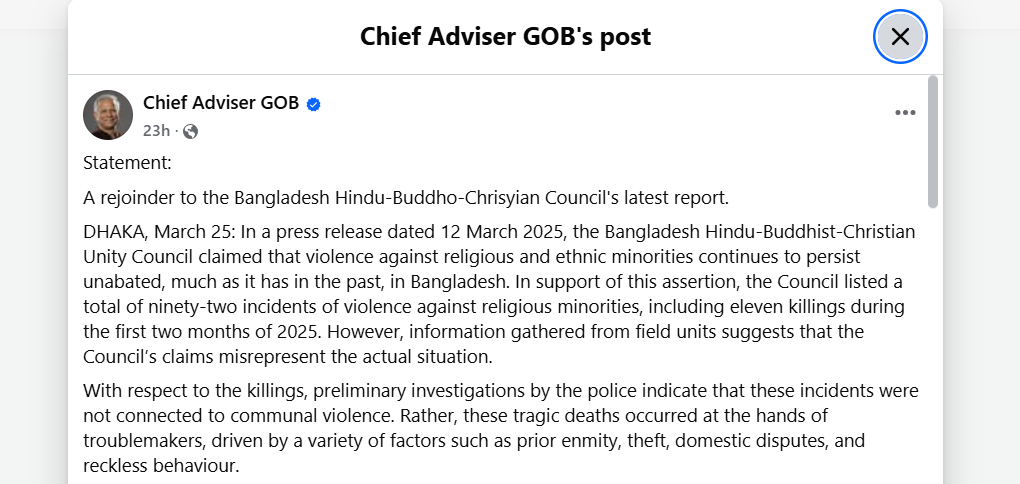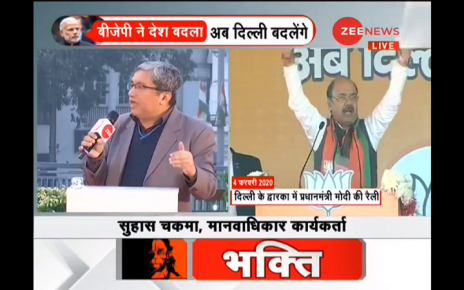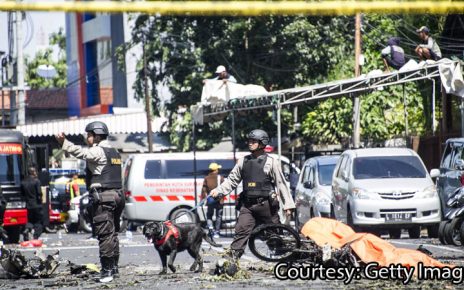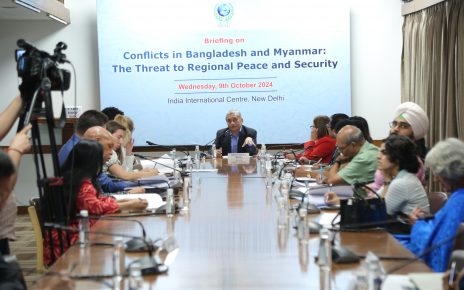The Rights and Risks Analysis Group (RRAG), today in a communication urged UN Secretary General, UN High Commissioner for Human Rights, Heads of Diplomatic Missions and International Organizations in Dhaka to intervene with the Chief Advisor of the Interim Government of Bangladesh against repeated emboldening of the religious fundamentalists belonging to the majority Muslims by describing acts of violence against Hindu, Buddhist and Christian minorities as personal disputes, criminal acts, or accidents with the aim to paint a picture that there are no attacks because of religious beliefs or given the vulnerability of the victims because of religious beliefs. These statements have sent a clear message to the perpetrators that the Chief Advisor will not take specific measures needed for the minorities and further makes the Bangladesh Hindu-Buddhist-Christian Unity Council extremely vulnerable to further attacks.
Yesterday i.e. 25 March 2025, Chief Advisor Dr Mohammed Yunus in “A rejoinder to the Bangladesh Hindu-Buddho-Christian Council’s latest report” stated that “With respect to the killings, preliminary investigations by the police indicate that these incidents were not connected to communal violence. Rather, these tragic deaths occurred at the hands of troublemakers, driven by a variety of factors such as prior enmity, theft, domestic disputes, and reckless behaviour”. Chief Advisor Dr Yunus cited 11 cases to state that “These examples illustrate that the deaths were largely the result of personal disputes, criminal acts, or accidents, not communal violence as claimed by the Council.”
The Bangladesh Hindu-Buddhist-Christian Unity Council in a press release on 13 March 2025 had stated that “violence against religious and ethnic minorities and indigenous communities continues unabated, as in the past. In the first two months of this year, January and February, a total of 92 incidents of violence targeting minorities and indigenous communities have occurred. These include 11 murders, 3 cases of rape, 25 attacks on temples, 1 allegation of religious disrespect, 6 attacks on indigenous communities, 38 incidents of attacks, vandalism, and looting of homes and businesses, 2 cases of job dismissals, and 6 other attacks.” The Council further stated “from 4th August to 31st December last year, a total of 2,184 incidents of attacks targeting minorities were reported. These included 32 murders, 133 attacks on places of worship, 13 cases of sexual abuse and rape of Hindu and indigenous women, 1,906 incidents of attacks, vandalism, looting, and arson on homes and businesses, 47 cases of land and business occupation, 38 incidents of physical assault, and 15 arrests on allegations of socalled religious disrespect.”
Regrettably, Chief Advisor Dr Mohammed Yunus has been consistently denying the attacks on religious minorities based on their beliefs by describing them as ‘politically motivated’. On 5 September 2024 without any investigation into any of the acts of violence against the Hindu religious minorities, Dr Yunus had stated that these attacks were ‘politically motivated’ as “there is no clear distinction between Awami League supporters and Hindus”.
Four months later on 10 January 2025, the Bangladesh Police claimed that out of 1,769 cases of reported attacks and vandalism against religious minorities, the police investigated 1,415 incidents, with 354 cases still under investigation. Among the investigated cases, 1,254 were found to be substantiated, while 161 lacked evidence. Of the verified cases, 1,234 incidents (98.4%) were politically motivated, and 20 cases (1.59%) were communal in nature. Therefore, Bangladesh Police effectively manufactured the investigation to substantiate the statement of Chief Advisor Dr Mohammed Yunus that these attacks were ‘politically motivated’ as “there is no clear distinction between Awami League supporters and Hindus”.
The assertion of Chief Advisor Dr Yunus and the Bangladesh Police that there are no attacks based on religious belief are contrary to the conclusive findings of the Office of the United Nations High Commissioner for Human Rights (OHCHR) which conducted an investigation at the invitation of Chief Advisor himself. The OHCHR in its “Fact-Finding Report: Human Rights Violations and Abuses Related to the Protests of July and August 2024 in Bangladesh” released on 12 February 2025 regarding the attacks on religious minorities had stated, “During and after the protests, members of the Hindu community, Ahmadiyya Muslims and indigenous groups in the Chittagong Hill Tracts, were also subject to violent attacks by mobs, including burning of homes and some attacks on places of worship. 1 Different and often intersecting motives drove these attacks, ranging from religious and ethnic discrimination to perceived opportunities for revenge against Awami League supporters among minorities, local communal disputes, including about land, and interpersonal issues. Some Jamaat-e-Islami and BNP supporters, members and local leaders were also involved in revenge violence and attacks on distinct religious and indigenous groups. However, the information available to OHCHR has not shown that such incidents were orchestrated or organised by these parties’ national leaderships, which also took steps to condemn violence targeting minority groups”.
The British Broadcasting Corporation (BBC) in its broadcast, “The plight of Hindus in Bangladesh: Part one” released on 3 January 2025 stated “shocking new videos of alleged attacks continue to appear on social media, with little or no acknowledgement from a world that is now questioning their legitimacy, and … the Hindu experience in Bangladesh has been met with silence from both the world’s media and the country’s authorities.”
The British Broadcasting Corporation (BBC) in its broadcast, “The plight of Hindus in Bangladesh: Part two” released on 10 January 2025, among others, also stated,
“The documentary then reveals that the attacks aren’t just aimed at buildings. Sahar meets victims, including an elderly village doctor recovering from an attempted murder and a grieving mother whose 14-year-old son was killed trying to escape the country.
The activists take Sahar to a nearly destroyed temple complex, its idols looted and desecrated. The site’s president implicates the Bangladesh National Party (BNP) and Jamaat-e-Islami for the attacks, revealing political motivations behind the violence.
The documentary also touches upon the rise of Islamism in Bangladesh in recent years, highlighting the harmful rhetoric by some Islamic-leaders, which many activists and victims say have been fueling the tension.”
The RRAG reiterated that the repeated dismissals of the attacks on religious minorities in Bangladesh by Chief Advisor Dr Yunus as “the result of personal disputes, criminal acts, or accidents, not communal violence as claimed by the Council” encourage the majority religious fundamentalists in Bangladesh to carry out further attacks on religious minorities and also make the Hindu Buddhist Christian Unity Council leaders vulnerable to attacks by the majority Muslim religious fundamentalists.
These are unbecoming of a head of the Government, that too a Nobel Laureate and regrettably Dr Yunus has become the Provocateur in Chief for the attacks on religious minorities by condoning the violence as normal criminal acts.
The RRAG urged to take note of the implications of denials of the attacks on religious minorities in Bangladesh and intervene with the Chief Advisor himself. The Chief Advisor’s denial has the potential to further increase attacks on 18 million religious minorities in Bangladesh.



